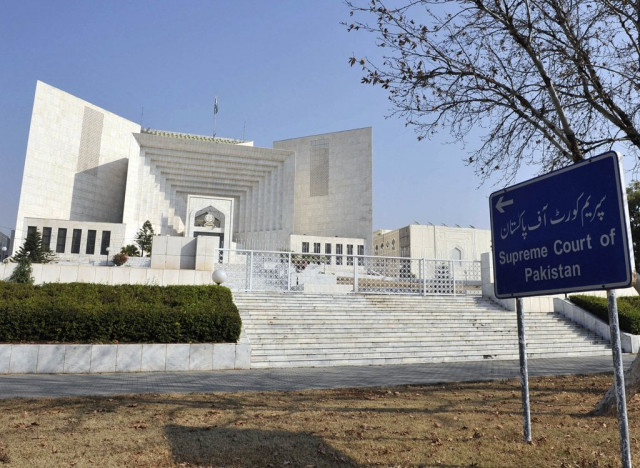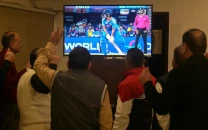SBC also challenges appointment of three SC judges
Says JCP violated principle of seniority while appointing LHC judges to apex court

The Sindh Bar Council (SBC) has also challenged elevation of three junior Lahore High Court (LHC) judges - Justice Qazi Muhammad Amin Ahmed, Justice Aminuddin Khan and Justice Sayyad Mazahar Ali Akbar Naqvi - to the Supreme Court of Pakistan.
The SBC through its counsel Rasheed A Rizvi has filed a constitution petition under Article 184 (3) of Constitution challenging elevation of the judges which, according to the bar association, took place in violation of the principle of seniority.
Justice Qazi Muhammad Amin Ahmed was appointed as an SC judge during the tenure of former chief justice of Pakistan Asif Saeed Khosa a month after his retirement from the LHC. He was 26th on the LHC seniority list.
Justice Aminuddin Khan was also elevated to the apex court even though he was fifth in terms of seniority in the LHC while Justice Mazahar Ali Akbar Naqvi was the third most senior judge in the LHC.
Earlier, Peshawar High Court (PHC) Chief Justice Waqar Ahmad Seth and the Khyber Pakhtunkhwa Bar Council had also challenged elevation of the judges to the SC "in violation of the principle of seniority".
According to sources, the SC office has already returned the PHC chief justice's petition by raising objections to it. Interestingly, none of petitioners have challenged elevation of Justice Munib Akhtar who was on number 4 on the seniority list of the Sindh High Court.
Lawyers are divided over elevation of judges to the SC against the seniority principle.
The Hamid Khan group wants judges to be elevated on basis of seniority. However, The Asma Jahangir Group believes that other factors like competence and integrity should also be considered in the appointment of SC judges.
A senior lawyer said as a matter of principle, only the best of high court judges should be considered for appointment as an SC judge and nomination of judges should be based on competence, integrity, performance and juristic ability and not merely seniority.
"This is for a number of reasons: firstly, such appointment is not a promotion. Secondly, the SC is the final court of appeal so every decision should state reasons with utmost ability.
"The SC exercises most significant and unusual power while exercising its original jurisdiction under Article 184 of the Constitution. All decisions of the SC serve as precedents to be followed all over the country," he said, while requesting anonymity.
He said historically speaking, before insertion of Article 175A in the Constitution, the bar frequently objected to the judicial appointments made in the SC in violation of seniority primarily for ensuring independence of the judiciary inasmuch as executive arm of the state used such appointments as a tool to discriminate against independent and upright judges.
"The situation has changed now. There is no fear or potential for external attack on independence of the judiciary post 18th Constitution amendment," he added.
Another senior member of the superior bar said there is, however, a legitimate concern that while dispensing with seniority, the power to elevate judges in the SC might be subjected to arbitrariness and favouritism.
"Therefore, we, in the meeting of the Pakistan Bar Council held on April 21, 2018 demanded restructuring this discretionary power of the Judicial Commission of Pakistan (JCP) [the constitutional forum responsible for judges' appointment] - while amending its rules."
SBC petition
In its petition, the SBC requested the SC that the permanent rules and regulations be framed by the apex court for the purpose of elevation of high court judges to the Supreme Court of Pakistan on the principle of seniority.
The petition raising objection to "out of turn" elevation to the SC contended that it leaves serious questions about the competence and fitness of the superseded judges.
"If the JCP considers the senior-most judge of a high court is not suitable for appointment as a junior judge in the Supreme Court, can lawyers or the general public retain any faith or respect for his ability to act as the chief justice over a whole province.
"Should not such judges be removed or forced to retire," said the petition.
The petition said public display of confidence in the abilities of a junior high court judge and corresponding lack of confidence in his seniors invariably creates bad blood among judges.
"Rivalries and camps are known to form; resentments are privately (even publicly) expressed. Indeed, in the latest appointment to the Supreme Court, at least one high court's chief justice is reported to have expressed his anguish in writing to the JCP.
"Needless to say, this does not auger well for either the internal harmony or external respect of the judicial institution."
The petition said this practice also opens the prospect of judges lobbying for appointment to the Supreme Court, especially since the Supreme Court judges retire three years later than high court judges.
"Whether such lobbying is directed towards the government or parliamentarians of members of the JCP itself - it is unseemly and an anathema to the concept of judicial independence. "
The petition said the practice of appointing junior judges creates an impression of arbitrariness in appointments.
"For example, when Mr Justice Qazi Amin Ahmed retired from the LHC, he was only twenty-sixth in seniority in the LHC. When [he was] elevated to the Supreme Court a month later, it was reportedly on account of his expertise in criminal law.
"By implication, therefore, the twenty-five judges senior to him (including, for example, Mr Justice Mazahir Ali Akbar Naqvi) in the LHC (let alone in other high courts) were not sufficiently expert in criminal law.
"Then why, only a year later, was Mr Justice Mazahir Ali Akbar Naqvi (whose foremost areas of expertise and publications and judgments listed on the Supreme Court website are in respect of criminal and anti-terrorism laws) appointed to the Supreme Court," it questioned.


















COMMENTS
Comments are moderated and generally will be posted if they are on-topic and not abusive.
For more information, please see our Comments FAQ